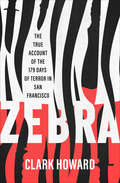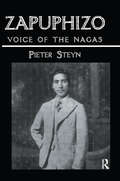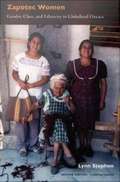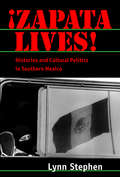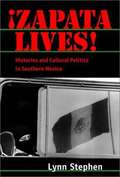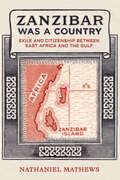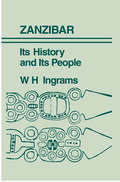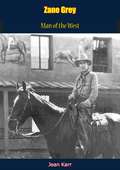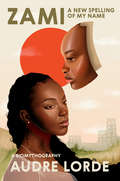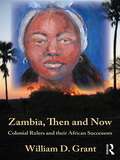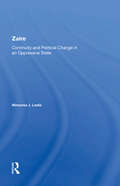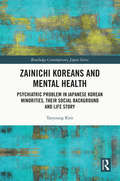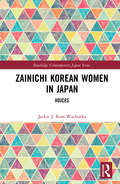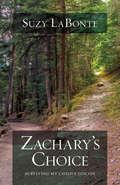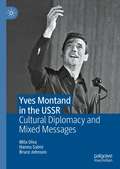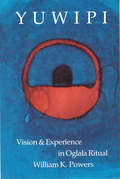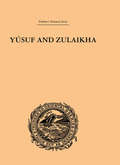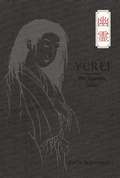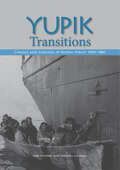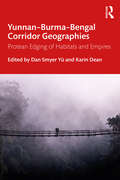- Table View
- List View
Zebratown
by Greg DonaldsonEight years in the making, this edgy, in-depth account follows a black felon’s attempt to find a new life for himself with a white woman in a small-town neighborhood where—as the book’s title implies—such relationships are common. A remarkably intense read, Zebratown reveals a rhythm of life spiked with violence, betrayal, sex, and the emotional dangers created by passionate love. Greg Donaldson’s Zebratown follows the life of Kevin Davis, an ex-con from Brownsville, Brooklyn, who, after his release from prison, moves to Elmira, New York, and takes up with Karen, a young woman with a six-year-old daughter. Kevin is seemingly the embodiment of hip-hop gangsterism—a heavily muscled, feared thug who has beaten a murder rap. And yet, as Donaldson’s stunning reportage reveals, Kevin has survived on the streets and in prison with a sharp intelligence and a rigid code of practical morality and physical fitness while yearning to make a better life for himself and be a better man. Month by month and year by year, Donaldson follows Kevin and Karen’s attempt to make a home together, a quest made harder by Kevin’s difficulty finding legal employment. The dangerous lures of the street remain for him, both in New York City and in Zebratown, and he is not always successful at avoiding them. Meanwhile, as Kevin and Karen struggle, the reader comes to care for them, even as they act in ways that society may not condone. Theirs is a complex story with many moments of drama, suffering, desire, and revelation—a story that is frequently astonishing and unforgettable to the end. Like Adrian Nicole LeBlanc in Random Family, Donaldson explores a largely hidden world; such immersion journalism is difficult to achieve but uniquely powerful to read. In addition to spending long periods with Kevin and Karen, Donaldson interviews policemen, judges, family members, and others in Kevin and Karen’s orbit, providing a remarkably panoramic account of their lives. Relationships between white women and black men have long been a hot issue in American culture. Even years after the 2008 presidential election, when society has in some ways seemingly moved on to a "postracial" perspective, people still have a lot to say about interracial relationships. Zebratown takes us into the heart of one and offers the paradoxical truth that while race is rarely not an issue in such relationships, in the end, what transpires between a couple is intensely individual. Meanwhile, the difficulty that ex-cons have successfully reentering society is an ongoing problem—for them, their families, and the communities where they live. Zebratown makes this struggle real, as Kevin Davis confronts not only his criminal record and his poor formal education but the cruelties of the postindustrial economy. Both his and Karen’s stories resonate powerfully with twenty-first-century American reality, and in telling them, Greg Donaldson confirms his position as one of the most intrepid journalists at work today.
Zebra: The True Account of the 179 Days of Terror in San Francisco
by Clark HowardEdgar Award Finalist: The true story of a string of brutal crimes committed in the name of religious fanaticism and racial hatred in 1970s San Francisco. In the early 1970s, a small band of well-dressed, clean-cut African American men began terrorizing the residents of San Francisco with guns and machetes. Their victims ranged from a teenage Salvation Army cadet to a middle-aged Jordanian grocer to an eighty-one-year-old janitor. The streets became deserted and tourism plunged. It took months before the culprits could be identified, with the help of an informer. They were members of a Black Muslim cult aspiring to earn the title &“Death Angel&” by slaughtering white victims. Combining history and dramatic recreations, this is the &“repellent but riveting&” in-depth story of a horrifying killing spree and the fanatical hatred that drove it—and the SFPD&’s desperate quest to take the culprits down (Kirkus Reviews). &“[Clark Howard&’s] pounding narrative meticulously describes the so-called Zebra killings of 1973–74, when 23 white San Franciscans were murdered or maimed by a group of Black Muslim extremists. In the retelling, the cold jargon of police files leaps starkly to life.&” —Time
Zaungespräche statt Brandschutzmauer: Die Beziehung von Werbung & Journalismus in Verlagen
by Corinna LauererAnders als etwa über die Beziehung des Journalismus zu Politik oder zu Public Relations wissen wir kaum etwas über die Beziehung von Journalismus und Werbung. Wie viel Koordination zwischen Redaktion und Werbevermarktung darf es geben, um die wirtschaftliche Effizienz zu steigern ohne die Autonomie der Redaktion zu gefährden? Die Kommunikationswissenschaft begnügt sich vielfach damit, auf das Ideal der sogenannten „Brandschutzmauer“ zu verweisen, die die Redaktion in Gänze von ökonomischen Überlegungen abschirmen soll. Die vorliegende Arbeit geht hingegen der Frage nach, wie es um die Beziehung der Redaktion mit der Anzeigenabteilung bzw. der Werbevermarktung in deutschen Verlagen steht und zu welchen Zwecken diese sich miteinander koordinieren. Die Ergebnisse legen nahe, dass ein gewisses Maß an Koordination der Redaktion und Werbevermarktung stets existiert hat, die Integration aber zunimmt – teils in Gestalt harmonischer Zusammenarbeit in strategischen Belangen und teils in Form konfliktreicher Auseinandersetzungen über hybride Werbeformen wie Native Advertising oder Affiliate-Marketing.
Zapuphizo
by SteynFirst published in 2006. Routledge is an imprint of Taylor & Francis, an informa company.
Zapotec Women: Gender, Class, and Ethnicity in Globalized Oaxaca
by Lynn StephenIn this extensively revised and updated second edition of her classic ethnography, Lynn Stephen explores the intersection of gender, class, and indigenous ethnicity in southern Mexico. She provides a detailed study of how the lives of women weavers and merchants in the Zapotec-speaking town of Teotitln del Valle, Oaxaca, have changed in response to the international demand for Oaxacan textiles. Based on Stephen's research in Teotitln during the mid-1980s, in 1990, and between 2001 and 2004, this volume provides a unique view of a Zapotec community balancing a rapidly advancing future in export production with an entrenched past anchored in indigenous culture. Stephen presents new information about the weaving cooperatives women have formed over the last two decades in an attempt to gain political and cultural rights within their community and standing as independent artisans within the global market. She also addresses the place of Zapotec weaving within Mexican folk art and the significance of increased migration out of Teotitln. The women weavers and merchants collaborated with Stephen on the research for this book, and their perspectives are key to her analysis of how gender relations have changed within rituals, weaving production and marketing, local politics, and family life. Drawing on the experiences of women in Teotitln, Stephen considers the prospects for the political, economic, and cultural participation of other indigenous women in Mexico under the policies of economic neoliberalism which have prevailed since the 1990s.
Los zapatos rojos son de puta: Desafiemos las creencias patriarcales
by Jorgelina Albano"Este es un libro que habla de los sesgos culturales enraizados en la sociedad. Su intención es hacerlos visibles", nos advierte desde el comienzo Jorgelina Albano, directora e ideóloga, entre tantas otras cosas, de Alabadas.com, el sitio que pretende generar impacto en la sociedad a través de testimonios de mujeres y hombres que han desafiado las creencias patriarcales para dar lugar a la equidad de género. Estas páginas funcionan como un acelerador de cambio cultural. Desde el título, provocan, inquietan, seducen, invitan. Proponen pensar distinto, cuestionar creencias arraigadas. Jorgelina Albano, directora e ideóloga de Alabadas.com, escribe en primera persona un libro abiertamente subjetivo y pasional. Toma partido, inclina la balanza, no se queda quieta e incita a todas las mujeres a hacer lo mismo. Hagamos vivible, nos dice, la distorsión de la mirada hacia uno y otro género. Desafiemos lo patriarcal para alcanzar la equidad. Afinemos la visión, revisemos perspectivas, excavemos y destruyamos los cimientos de una sociedad profundamente desigual para mujeres y varones. Y sobre esas ruinas edifiquemos lo nuevo. Solo si cambiamos la mirada lograremos transformar el mundo.
Zapatismo Beyond Borders
by Alex KhasnabishOn January 1, 1994 in the far southeast of Mexico, a guerrilla army of indigenous Mayan peasants calling itself the Zapatista Army of National Liberation rose up in rebellion against 500 years of colonialism, imperialism, genocide, racism, and neoliberal capitalism. Zapatismo Beyond Borders examines how Zapatismo, the political philosophy of the Zapatistas, crossed the regional and national boundaries of the isolated indigenous communities of Chiapas to influence diverse communities of North American activists. Providing readers with anthropological perspectives that draw on a year of fieldwork with activists, and also enriched by the author's own experience with contemporary social justice struggles, Alex Khasnabish examines the "transnational resonance" of the Zapatista movement. He shows how the spread of Zapatismo has unexpectedly produced new imaginations and practices of radical political action in diverse socio-political movements throughout North America. Zapatismo Beyond Borders is an engaging study of a radical political philosophy that has been both a model for grassroots organizations and a rallying call for members of the anti-globalization movement. Rigorous and engaged, this will be of interest to anyone interested in indigenous rights movements, political philosophy, and the recent history of political activism.
Zapata Lives! Histories and Cultural Politics in Southern Mexico
by Lynn StephenThis richly detailed study chronicles recent political events in southern Mexico, up to and including the July 2000 election of Vicente Fox. Lynn Stephen focuses on the meaning that Emiliano Zapata, the great symbol of land reform and human rights, has had and now has for rural Mexicans. Stephen documents the rise of the Zapatista rebellion in Chiapas and shows how this rebellion was understood in other parts of Mexico, particularly in Oaxaca, giving a vivid sense of rural life in southern Mexico. Illuminating the cultural dimensions of these political events, she shows how indigenous Mexicans and others fashioned their own responses to neoliberal economic policy, which ended land reform, encouraged privatization, and has resulted in increasing socioeconomic stratification in Mexico. Mixing original ethnographic material drawn from years of fieldwork in Mexico with historical material from a variety of sources, Stephen shows how activists have appropriated symbols of the revolution to build the contemporary political movement. Her wide-ranging narrative touches on the history of land tenure, racism, gender issues in the Zapatista movement, local political culture, the Zapatista uprising of the 1990s and its aftermath, and more. A significant addition to our knowledge of social change in contemporary Mexico, Zapata Lives! also offers readers a model for engaged, activist anthropology.
Zapata Lives! Histories and Cultural Politics
by Lynn StephenThis detailed study chronicles recent political events in southern Mexico, up to and including the July 2000 election of Vicente Fox. Lynn Stephen focuses on the meaning that Emiliano Zapata, the great symbol of land reform and human rights, has had and now has for rural Mexicans. Stephen documents the rise of the Zapatista rebellion in Chiapas and shows how this rebellion was understood in other parts of Mexico, particularly in Oaxaca, giving a vivid sense of rural life in southern Mexico.
Zanzibar Was a Country: Exile and Citizenship between East Africa and the Gulf (California World History Library #32)
by Nathaniel MathewsZanzibar Was a Country traces the history of a Swahili-speaking Arab diaspora from East Africa to Oman. In Oman today, whole communities in Muscat speak Swahili, have recent East African roots, and practice forms of sociality associated with the urban culture of the Swahili coast. These "Omani Zanzibaris" offer the most significant contemporary example in the Gulf, as well as in the wider Indian Ocean region, of an Afro-Arab community that maintains a living connection to Africa in a diasporic setting. While they come from all over East Africa, a large number are postrevolution exiles and emigrés from Zanzibar. Their stories provide a framework for the broader transregional entanglements of decolonization in Africa and the Arabian Gulf. Using both vernacular historiography and life histories of men and women from the community, Nathaniel Mathews argues that the traumatic memories of the Zanzibar Revolution of 1964 are important to nation-building on both sides of the Indian Ocean.
Zanzibar: The Island Metropolis of Eastern Africa
by W.H. IngramsThis book provides a historical ethnography of the islands of Zanzibar and Pemba. It describes local legends, and their important social function in recording and constituting the oral history of the islands. The book also provides a detailed and lively account of the society in the islands.
Zane Grey: Man of the West
by Jean KarrZane Grey—Plainsman, Sportsman, Author—actually lived the rugged, adventurous life made famous in his exciting books. The blood of Indian chiefs flowed in his veins and he knew intimately many of the characters and landmarks of the great Southwest. His thrilling stories, recapturing the glory of the West, are packed with color, action and romance.This is a biography by author Jean Karr, who had also published a biography on early 20th-century novelist Grace Livingston Hill in 1948.
Zami A New Spelling of My Name: A New Spelling of My Name
by Geraldine Audre Lorde"ZAMI is a fast-moving chronicle. From the author's vivid childhood memories in Harlem to her coming of age in the late 1950s, the nature of Audre Lorde's work is cyclical. It especially relates the linkage of women who have shaped her . . . Lorde brings into play her craft of lush description and characterization. It keeps unfolding page after page."-Off Our BacksFrom the Trade Paperback edition.
Zambia Then And Now: Colonial Rulers and their African Successors
by William GrantWritten by a member of the last generation of British Colonial Service Officers in Africa, the book seeks to place both colonial rulers and their African successors in the context of history and the circumstances of their time, viewing their achievements and failures critically but not unsympathetically and comparing colonial society with that of the independent African country that Northern Rhodesia has become. Colonialism is viewed at the day to day level of the administration of a rural district by four officers and a handful of African district messengers, who worked together without even a telephone to assist them. With a wealth of detail that can only come from experience, Grant’s work makes an important contribution to the understanding of a time, place, period and practices that are only now being considered in a balanced way.
Zaire: Continuity And Political Change In An Oppressive State
by Winsome J LeslieThis book describes the historical setting of Zaire and focuses on economic and political developments during the Mobutu era. It examines the corrupt and closed political system, with its roots in the colonial state and precolonial political patterns.
Zainichi Koreans and Mental Health: Psychiatric Problem in Japanese Korean Minorities, Their Social Background and Life Story (Routledge Contemporary Japan Series)
by Taeyoung KimUsing a qualitative, interview-based approach, Kim investigates how conflicting identities and social marginalization affect the mental health of members of the ethnic Korean minority living in Japan. So-called “Zainichi” Koreans living in Japan have a higher suicide rate than native Japanese, or than any other ethnic group within Japan, a country which has one of the highest suicide rates in the world. Considering themselves neither truly Korean nor wholly Japanese, they are mainly descendants of immigrants who came to Japan during the colonial period in the late 19th and early 20th centuries. Kim explores the challenges facing these individuals, including the dilemmas of ethnic education, the discrimination against them by mainstream society, and the consequent impacts on their mental health. An insightful read both for scholars of Japanese culture and society and for anthropologists and sociologists with an interest in the effects of marginalization on ethnic minority citizens more broadly.
Zainichi Korean Women in Japan: Voices (Routledge Contemporary Japan Series)
by Jackie J. Kim-WachutkaPresenting the voices of a unique group within contemporary Japanese society—Zainichi women—this book provides a fresh insight into their experiences of oppression and marginalization that over time have led to liberation and empowerment. Often viewed as unimportant and inconsequential, these women’s stories and activism are now proving to be an integral part of both the Zainichi Korean community and Japanese society. Featuring in-depth interviews from 1994 to the present, three generations of Zainichi Korean women—those who migrated from colonial Korea before or during WWII and the Asia-Pacific War and their Japan-born descendants—share their version of history, revealing their lives as members of an ethnic minority. Discovering voices within constricting patriarchal traditions, the women in this book are now able to tell their history. Ethnography, interviews, and the women’s personal and creative writings offer an in-depth look into their intergenerational dynamics and provide a new way of exploring the hidden inner world of migrant women and the different ways displacement affects subsequent generations. This book goes beyond existing Anglophone and Japanese literatures, to explore the lives of the Zainichi Korean women. As such, it will be invaluable to students and scholars of Japanese and Korean history, culture and society, as well as ethnicity and Women’s Studies.
Zainichi Korean Identity and Ethnicity (Routledge Contemporary Japan Series #10)
by David ChapmanShedding light on contemporary Japanese society in an international context, Japanese-Korean relations and modern day notions of a multicultural Japan, this book addresses the broad notions and questions of citizenship, identity, ethnicity and belonging through investigation of Japan’s Korean population (zainichi). Despite zainichi Korean existence being integral to, and interwoven with, recent Japanese social history, the debates and discussions of the Korean community in Japan have been largely ignored. Moreover, as a post colonial context, the zainichi Korean situation has drawn scant attention and little investigation outside of Japan. In Zainichi Korean Ethnicity and Identity David Chapman seeks to redress this balance, engaging with recent discourse from within Japan’s Korean population. By taking a close look at how exclusion, marginalisation and privilege work, the book brings insight into the mechanisms of discrimination, and how discourse not only marginalizes individuals and groups, but also how it can create social change and enhance the sense of self. This book will be of interest to students and scholars of Asian studies and of Japanese and Korean politics, culture and society, but also to those with a broader interest in migration studies and the study of identity and ethnicity.
Zachary's Choice
by Suzy LabonteA Christian homeschooling mom of a large family, Suzy LaBonte never imagined one of her children might die by suicide. She received an agonizing blow the day her sixteen-year-old son, Zachary, without threat or forewarning, chose to end his own life. The following months were bleak and sorrowful as Suzy struggled down a confusing path of shock, anger, guilt, and depression. Slowly putting one foot in front of the other, Suzy focused on the unfailing character of God, her husband's faithful partnership, and the hopeful faces of the children before her. Plodding and stumbling toward understanding and healing, Suzy found that God's faithful companionship and the promises of His Word lightened the darkest hours and sustained her life. Healing came slowly and with it, transforming lessons of pain and courage. With a passion to reach out to encourage other suicide survivors, Suzy shares the healing that is found in Christ Jesus.Includes a Survival Guide for those impacted by suicide and suggested resources for further support.
Yves Montand in the USSR: Cultural Diplomacy and Mixed Messages
by Mila Oiva Hannu Salmi Bruce JohnsonThis volume is the first book-length account of Yves Montand’s controversial tour of the Soviet Union at the turn of the years 1956/57. It traces the mixed messages of this internationally visible act of cultural diplomacy in the middle of the turbulent Cold War. It also provides an account of the celebrated French singer-actor’s controversial career, his dedication to music and to peace activism, as well as his widespread fandom in the USSR. The book describes the political background for the events of the year 1956, including the changing Soviet atmosphere after Stalin’s death, portrays the rising transnational stardom of Montand in the 1940s and 1950s, and explores the controversies aroused by his plan to visit Moscow after the Hungarian Uprising. The book pays particular attention to Montand’s reception in the USSR and his concert performances, drawing on unique archival material and oral history interviews, and analyses the documentary Yves Montand Sings (1957) released immediately after his visit.
Yuwipi: Vision and Experience in Oglala Ritual
by William K. PowersA profoundly spiritual book, Yuwipi describes a present-day Oglala Sioux healing ritual that is performed for a wide range of personal crises. The vivid narrative centers on the experience of a hypothetical father and son in need of spiritual and physical assistance. The author combines the Yuwipi ceremony with two ancient Sioux rituals often performed in conjunction with it, the vision quest and the sweat lodge. Wayne Runs Again, suffering from alcoholism and worried about his father’s health, seeks out a shaman who, while bound in darkness, calls on supernatural beings to free him and to communicate. While the young man undergoes purification in a sweat lodge and waits on a hill for a vision, the community prays for him and his father. The ceremony serves not only to cure the sick but also to reaffirm the continuity of Oglala society.
Yusuf and Zulaikha: A Poem by Jami
by Ralph T.H. GriffithFirst Published in 2000. Routledge is an imprint of Taylor & Francis, an informa company.
Yurei
by Zack Davisson"I lived in a haunted apartment." Zack Davisson opens this definitive work on Japan's ghosts, or yurei, with a personal tale about the spirit world. Eerie red marks on the apartment's ceiling kept Zack and his wife on edge. The landlord warned them not to open a door in the apartment that led to nowhere. "Our Japanese visitors had no problem putting a name to it . . . they would sense the vibes of the place, look around a bit and inevitably say 'Ahhh . . . yurei ga deteru.' There is a yurei here."Combining his lifelong interest in Japanese tradition and his personal experiences with these vengeful spirits, Davisson launches an investigation into the origin, popularization, and continued existence of yurei in Japan. Juxtaposing historical documents and legends against contemporary yurei-based horror films such as The Ring, Davisson explores the persistence of this paranormal phenomenon in modern day Japan and its continued spread throughout the West.Zack Davisson is a translator, writer, and scholar of Japanese folklore and ghosts. He is the translator of Mizuki Shigeru's Showa 1926-1939: A History of Japan and a translator and contributor to Kitaro. He also worked as a researcher and on-screen talent for National Geographic's TV special Japan: Lost Souls of Okinawa. He writes extensively about Japanese ghost stories at his website, hyakumonogatari.com.
Yupik Transitions: Change and Survival at Bering Strait, 1900-1960
by Igor Krupnik Michael ChlenovThe Siberian Yupik people have endured centuries of change and repression, starting with the Russian Cossacks in 1648 and extending into recent years. The twentieth century brought especially formidable challenges, including forced relocation by Russian authorities and a Cold War “ice curtain” that cut off the Yupik people on the mainland region of Chukotka from those on St. Lawrence Island. Yet throughout all this, the Yupik have managed to maintain their culture and identity. Igor Krupnik and Michael Chlenov spent more than thirty years studying this resilience through original fieldwork. In Yupik Transitions, they present a compelling portrait of a tenacious people and place in transition—an essential portrait as the fast pace of the newest century threatens to erase their way of life forever.
Yunnan–Burma–Bengal Corridor Geographies: Protean Edging of Habitats and Empires
by Dan Smyer Yü Karin DeanThis book explores the historical interconnections between Bengal, Burma, and Yunnan (China), and views the corridor as a transregion that exhibits mobility, connectivity and diversity as well as place-based ecogeological uniqueness. With a focus on the concept of corridor geographies that have shared human and environmental histories beyond sharply demarcated territorial sovereignties of modern individual nation-states, it presents the variety and complexity of premodern and modern pathways, corridors, borders, and networks of livelihood-making, local political alliances, trade and commerce, religions, political systems, and colonial encounters. The book discusses crucial themes including environmental edgings of human-nonhuman habitats, transregional migratory routes and habitats of megafauna, elephant corridors in Yunnan–Myanmar–Bengal landscape, framing spaces between India and China, Tibetan–Myanmar corridors, transboundary river systems, narratives of a Rohingya jade trader, cross-border flow of De’ang’s fermented tea, householding in upland Laos, cultural identities, and trans-border livelihoods. Comprehensive and topical, with its wide-ranging case studies, this book will be of interest to scholars and researchers of history, routes and border studies, sociology and social anthropology, South East Asian history, South Asian history, Chinese studies, environmental history, human geography, international relations, ecology, and cultural studies.

